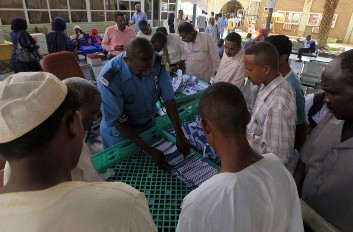300,000 Sudanese expat workers could face deportation from Saudi Arabia: report
November 5, 2013 (KHARTOUM) – Around 300,000 Sudanese expats in Saudi Arabia could face deportation after failing to adjust their status in compliance with the new rules declared by the Ministry of Labor in Riyadh.

According to al-Khartoum daily newspaper unofficial figures show that there 900,000 Sudanese migrant workers in Saudi Arabia of which 600,000 are in compliance with labor and immigration laws.
The newspaper quoted government sources as saying that the government has no intention of assisting the returnees because it is currently preoccupied with its economic crisis.
So far 900 Sudanese expats have arrived in the Red Sea coastal city of Port Sudan from Saudi Arabia.
The same sources ruled out having the returnees would accommodated into government positions as the majority of them are low-skilled workers which means they could possibly be employed in the agricultural and grazing sectors.
It emphasized that Saudi authorities were determined to enforce the new visa rules and deporting all illegal workers who fail to correct their status, saying that they informed foreign consulates to deport their undocumented nationals and assigned them special offices tasked with issuing emergency visas.
Sudanese workers abroad especially in the Arab Gulf countries are one of the main sources of hard currency through their remittances they send to their families.
Since the secession of oil-rich south in July 2011, Sudan’s reserves of hard currency started to dry up thus making the local currency fall to its lowest level to record last month.
(ST)
